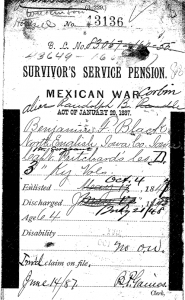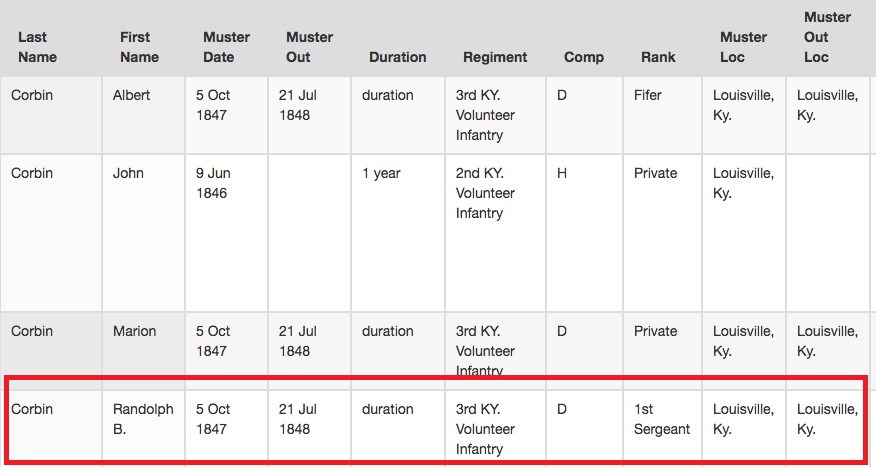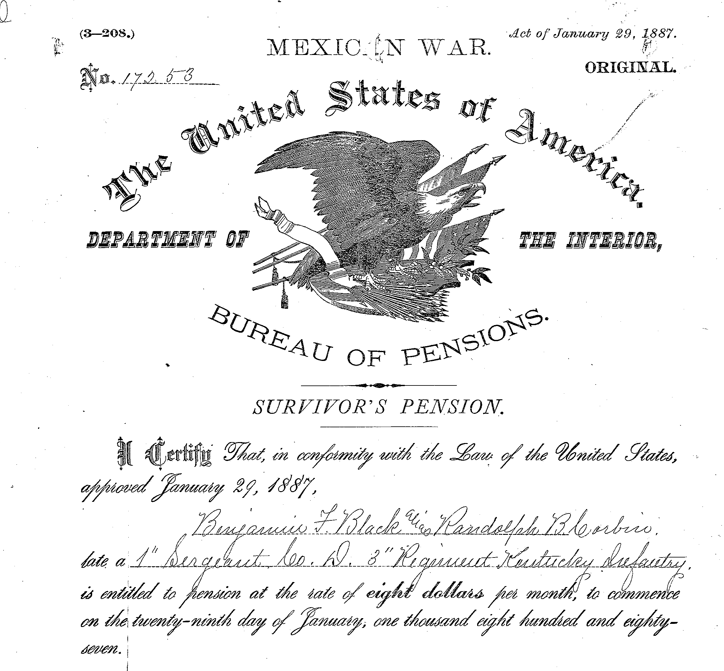Cynthia Black accidentally stumbled into her late husband’s pension fraud when she applied to receive her widow’s pension.
Here’s an overview of the timeline: my great-great-great-grandfather Benjamin Black had filed for his pension back on May 5, 1887 while still living in Iowa; he was finally awarded the pension in October of the following year. By September of 1889, he was living in Kenton County, Kentucky and married to Cynthia. Two years later, he died in Kentucky. So it appears that he drew this pension benefit for almost three years. Let’s review his original pension application and a few of the hoops he had to jump through – it appears that pension officials may have been suspicious from the start.
He was applying for his pension on the basis of a brand-new law, just passed on January 29, 1887. Veterans of the Mexican War were eligible for this new kind of pension if they met three requirements: (1) had served for 60 days or were actually engaged in battle; (2) were honorably discharged and (3) were at least 62 years of age.
He was assisted in the application process by the law office of George E. Lemon in Washington D.C. I did a little bit of googling – I think this was an established law firm whose primary business was assisting veterans with their military pensions. Were the lawyers in on the scam? I’d have to give them the benefit of the doubt and assume that they were not. There were plenty of deserving veterans out there to keep them in business, and putting fraudulent applications through the process would surely hurt their reputation. Pension fraud was known to be rampant, however.
In his Declaration, he filed under both his own name (Benjamin F. Black) and an alias (Randle B. Corbin). The form provides a fill-in-the-blank for an alias – the applicant was supposed to declare his name plus the name he “served under”. This was typically, I believe, supposed to clear up any confusion about nicknames, middle names, the use of initials, etc. But in Benjamin’s case, he specified two completely different names. He offered no explanation at the time.
His application went on to describe his regiment and commanding officers, the action that he saw, and the details of his discharge.
The Kenton County Library has a wonderful genealogy section on its website, including a database of Mexican War veterans. We find information for the real Randolph Corbin there.
The real Randolph Corbin mustered in on October 5, 1847 – but Benjamin claimed May 5, 1846. The real Randolph Corbin mustered out on July 21, 1848, but Benjamin claimed June 20, 1848.
 This mix-up on the dates was apparently confusing to the pension officials, also, as you can see from all the scratching-out on the cover card for his pension file. I don’t suppose this by itself raised any red flags as I think it would be understandably difficult to recall exact dates for something that had occurred forty years earlier. (Notice that the Randle/Randolph confusion involves some scratching-out as well.)
This mix-up on the dates was apparently confusing to the pension officials, also, as you can see from all the scratching-out on the cover card for his pension file. I don’t suppose this by itself raised any red flags as I think it would be understandably difficult to recall exact dates for something that had occurred forty years earlier. (Notice that the Randle/Randolph confusion involves some scratching-out as well.)
I haven’t worked with Mexican War pension files before, so I don’t have a point of reference for expected timeline for the approval process, or for the types of affidavits and other paperwork that had to be submitted.
His application languished for a while, and then he submitted a second affidavit. I’m guessing that the pension officials had some questions about the alias business. His secondary affidavit was submitted on October 24, 1887.
He mostly re-states the information offered in his initial application. He has apparently been asked to provide contact information for others who served with him, and his explanations don’t sound very genuine. He offers no explanation at all for the use of the other name. But by this time, he’s figured out that the alias is Randolph, not Randle (yeah, that’s the ticket):
I, Benjamin F. Black, being duly sworn according to law depose and say: That I am the identical person who enlisted in Co. D 3rd Regt. Kentucky Vols in May 1846 under the name Randolph B. Corbin. That under the name of Randolph B. Corbin I served in said Co. and Regiment until June 1848 when I was mustered out and discharged at Covington, Kentucky. That while with said Reg’t and during my term of enlistment I took part in the taking of Very Cruz [sic] and the campaign that followed to the close of the Mexican War. That since my said discharge I have resided in the States of Indiana and Iowa under the name of Benjamin F. Black which is my true name. that I have lost sight of my comrades who served with me during said Mexican War and although I have made great efforts to find the whereabouts of all of them I cannot learn of the residence of any one of them. That I am at the present time 64 years of age.
Benjamin F. Black
He’s asked to submit yet another affidavit a few months later, but this one only addressed whether or not he had already received a bounty land warrant for his service (I’m guessing that if you claimed a land award for your service, you could not additionally draw a pension). I’ve not seen any references to bounty land awarded to either Benjamin Black or Randolph Corbin, but those records are not very well centralized or indexed. But I’m guessing that his affidavit in this regard was truthful.
At this point, it seems that the pension officials finally needed some sort of evidence concerning all this alias business. Although in October 1887, Benjamin said he didn’t know where any of his comrades were living, a year later he’s able to connect with someone. On October 15, 1888, a gentleman by the name of John Bills completes an affidavit.
Now John Bills really did serve in the Mexican War for a time, and we find him in the database as well:
He was in the same company as Randolph Corbin, but discharged only one month after mustering due to some sort of disability. So what does Mr. Bills have to say?
On this 15th day of October A.D. 1888 before me Mayor, City of Ludlow, personally appeared John Bills age 72 years residing at Constance, Boone Co., Ky, who being by me duly sworn says that he was a private in Co. D 3rd Ky. Vols “Mexican War” and am well acquainted with Benj. F. Black who was a member of said Company who resides at North English, Iowa and is now an applicant for a pension on account of being sick.
I knew said Benjamin F. Black before he joined the Army and he was well after he was in the service a while he got sick and was sick nearly all the name afterward was not able to do any duty while we were at Louisville Ky. He was more or less sick during service and that the said Benj. F. Black went by the name of Randolph B. Corbin and that I know him to be the same man.
That I have no interest direct or indirect in the claim aforesaid.
Mr. Bills goes on and on about Benjamin’s health – the pension was to be awarded on the basis of age, not disability. Mr. Bills may have been confused because his own pension was on the basis of disability. But it was sure nice of Mr. Bills to give Benjamin cover on that! Again, there is absolutely no explanation offered for the use of the alias.
Mr. Bills swore his affidavit in the presence of the mayor of the small town of Ludlow, Kentucky. At first I thought the mayor may have been in on the scam, but I now think it may have been normal business for elected officials to assist citizens in witnessing affidavits.
So who is John Bills? When the investigation was all complete, the examiner stated the following in his final report:
The survivor claim was originally allowed under misaffirmed testimony. No effort appears to have been made to test the value of comrade John Bills testimony or to ascertain his character for truth. He is a shanty boat occupant somewhere on either the Ohio or Mississippi River and said to be unreliable. He formerly lived at Constance, Ky but has left there long since, and no one there seems to know his present P.O. address.
But in 1887, Mr. Bills’ affidavit was apparently deemed good enough for the pension officials who were reviewing Benjamin’s application.
Benjamin Black was awarded his pension certificate just a couple of weeks later, and he began receiving his benefit of $8 per month. He received the benefit for the rest of his life. Next time we’ll see what happened when the Special Examiner arrived at Cynthia’s door.




Very interesting! Love it!